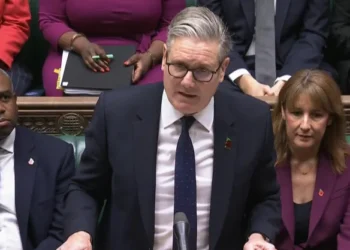Labour is planning to replace the current Chair of (National Health Service) NHS England, Richard Meddings, with a party loyalist following a potential victory in the upcoming election.
The party is considering candidates such as Alan Milburn, a former Health Secretary, Jacqui Smith, a former Home Secretary, and Sally Morgan, who served as Tony Blair’s Political Secretary.
This move is aimed at implementing Labour’s plans to revitalize the NHS, which Labour views as being in a “broken” state.
The decision to replace Meddings is seen as necessary to gain more influence over NHS England, especially given its independence from the government since 2012.
Alan Milburn, as a former Health Secretary, played a significant role in introducing radical changes to the NHS, including the creation of foundation trusts.
Labour wants to install a senior figure from the last time it was in power to give it more influence over NHS England, which became independent from the government as a result of changes made in 2012 by the then Conservative Health Secretary, Andrew Lansley.
Jacqui Smith, although criticized for taking a leave of absence during the Covid pandemic to participate in “Strictly Come Dancing,” has experience in healthcare management through her roles as Chair of the University Hospitals Birmingham trust and currently the Barts health trust in London.
Sally Morgan brings a background in government and political relations, having worked closely with Tony Blair and chaired the Royal Brompton and Harefield specialist heart and lung trust.
Whoever Labour appoints will have to help improve relations between NHS England and the Department of Health and Social Care.
Insiders say the relationship “is at an all-time low” after a series of behind-the-scenes clashes in recent years between NHS England’s chief executive, Amanda Pritchard, and health secretaries notably Steve Barclay over the service’s funding and priorities.
The new chair is expected to support Wes Streeting, the shadow Health Secretary, in achieving ambitious pledges to improve NHS performance, particularly in reducing waiting times in A&E departments and for planned hospital treatments.
This move reflects Labour’s strategic focus on healthcare reform and its intention to align NHS England more closely with its own policies and objectives.
“Labour feel they need to repair that damage and that NHS England needs new leadership and that a Labour person who would work well with Wes would be the best way to go forward.”
A source revealed.
Labour’s NHS Plan Aimed At Addressing Various Healthcare System

Labour’s plan to revitalize the NHS encompasses several key reforms aimed at addressing various aspects of the healthcare system.
Labour aims to halve the gap in healthy life expectancy between the richest and poorest regions in England, recognizing the stark disparities in health outcomes across and within communities.
There’s a commitment to prioritize women’s health as part of the NHS reforms, acknowledging past neglect in this area.
Labour intends to commission a new HIV action plan in England, targeting the eradication of new HIV cases by 2030.
A key component of Labour’s plan involves cutting NHS waiting times significantly, with a goal of providing 40,000 more appointments every week.
The plan includes doubling the number of cancer scanners available, aiming to catch more cancers early and potentially save thousands of lives.
Moreover, a new Dentistry Rescue Plan is proposed to address the challenges faced by the dental sector, ensuring better access to dental care for all.
Labour plans to recruit 8,500 additional mental health staff, specifically trained to support individuals at risk. This expansion is part of a broader effort to give mental health the same level of attention and focus as physical health.
Every young person will have access to a specialist mental health professional at school, and Young Futures hubs will be established in every community to offer open-access mental health services for young people.
All of Labour’s policies related to the NHS are fully-funded, with commitments not to increase income tax, national insurance, or VAT to finance these reforms.
These reforms represent a comprehensive approach to revitalizing the NHS, focusing on reducing health inequalities, improving access and efficiency, enhancing mental health services, and ensuring the sustainability of the healthcare system through responsible funding mechanisms.
READ ALSO: Stonebwoy Notifies Charterhouse To Announce 2019 Artiste of the Year Winner























